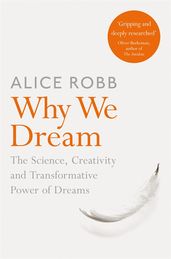Why do we dream? 4 facts you didn’t know about dreaming
Have you ever wondered why we dream? In her book, Alice Robb, who falls within just 10% of the population who are able to lucid dream, aims to answer exactly that.

In Why We Dream, Alice Robb, a leading American science journalist and rare lucid-dreamer, meets the scientists dedicated to the study of dreams. She explores the groundbreaking science behind why we dream and their importance to our mental health, ability to learn and face life’s challenges. Here are just a few of the incredible facts about why we dream . . .
Dreams help us to problem-solve
In Why We Dream, Alice Robb explains how dreams can give us insight into personal problems. Not only does the symbolism and surrealism of our dream imagery help us to see our problems and possible solutions to them in a new light, but we also withhold judgement when we sleep, allowing ourselves to consider ideas we otherwise might dismiss.
Dreams can heighten our creativity
Numerous artists, from Graham Greene to Paul McCartney, have spoken of how their dreams have had a positive influence on their creative work. In the 1990s, physician James Pagel interviewed screenwriters, actors and directors about how their dreams factored into their daily lives and found that their dream recall was much higher than that of the general population. Robb believes that ‘exceptionally creative people may be naturally prone to vivid dreaming’.
Dreams help us to prepare for the challenges of real life
Dreams can be hugely valuable in helping us to prepare for future events, particularly those that we’re feeling stressed or nervous about. Dreaming about these future experiences allows us to run through various scenarios and our reactions to them, leaving us feeling more ready to tackle the situation in real life. A study of students who were preparing to take their medical school entrance exam found that there was a significant relationship between students who dreamed often about the upcoming test, and the students who performed best in real life. Although unpleasant, those dreams where you fail an exam or turn up to the first day of a new job naked could be setting you up for success!
Dreams can have a positive effect on our mental health
Although the link between dreams and mental health hasn’t been fully explained, a study has found that the number of people in severely depressed populations who can regularly recall their dreams is much lower than the number in the general population. It’s unclear whether this lack of dreams is a cause or an effect of depression, but it certainly may deepen the depression, depriving sufferers of an opportunity to process their pain.
Why We Dream
by Alice Robb
In Why We Dream, Alice Robb takes readers on a journey to uncover why we dream, why dreaming is important, and how we can improve our dream life. You’ll never think of your dreams in the same way again.



